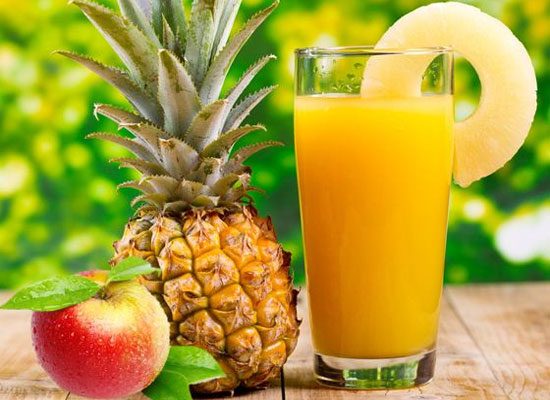
pineapple juice
Table of Contents
Introduction
By integrating pineapple juice benefits into your daily regimen, you can experience firsthand its advantages. It supports digestive health, provides essential vitamins and minerals, and offers numerous documented health benefits.
Explore how the nutritional value of pineapple juice can elevate your diet, contributing to a healthier you.
Key Takeaways
- Boosts energy and supports a healthier lifestyle
- Rich in essential vitamins and minerals
- Supports digestive health
- Provides anti-inflammatory benefits
- Enhances overall well-being
- Supports immune function
- Contributes to a balanced diet
What Makes Pineapple Juice a Nutritional Powerhouse?
Pineapple juice, distinguished by its rich composition of vitamins, minerals, and enzymes, emerges as a nutritional powerhouse. Its inclusion in one’s diet can yield a plethora of health benefits.
The Unique Nutritional Profile of Pineapple Juice
Pineapple juice is a treasure trove of essential nutrients, enhancing overall health. It boasts a variety of vitamins and minerals, indispensable for maintaining optimal bodily functions.
Essential Vitamins and Minerals
Pineapple juice is a prime source of vitamin C, manganese, and other critical nutrients. Vitamin C is pivotal for immune function, whereas manganese is crucial for bone health and metabolic processes.
Bromelain: The Special Enzyme
The presence of bromelain, a unique blend of enzymes, sets pineapple juice apart. Bromelain facilitates digestion and exhibits anti-inflammatory properties. Its benefits extend to enhanced protein digestion and potential relief from inflammation.
How Pineapple Juice Compares to Other Fruit Juices
In comparison to other fruit juices, pineapple juice’s nutritional profile is particularly noteworthy. The table below delineates the nutritional disparities:
| Fruit Juice | Vitamin C (mg) | Manganese (mg) | Calories |
| Pineapple Juice | 130 | 1.5 | 130 |
| Orange Juice | 124 | 0.1 | 110 |
| Grapefruit Juice | 70 | 0.03 | 96 |
The data reveals that pineapple juice is replete with vitamin C and manganese, positioning it as a more nutritious option compared to other fruit juices.
The History and Cultural Significance of Pine apple Juice
The origins of pineapple juice are deeply rooted in ancient cultures, where it was cherished for its distinctive taste and health benefits. The narrative of pineapple juice’s history is as complex as its flavor, tracing back to the initial interactions between European explorers and the indigenous peoples of South America.
From Tropical Fruit to Popular Beverage
Pineapple, once a rare and exotic fruit, evolved into a symbol of hospitality and warmth across various cultures. With the expansion of global trade, pineapple cultivation extended to tropical regions worldwide, rendering pineapple juice more accessible. Today, it is savored globally, celebrated for its tropical flavor and its multitude of health advantages.
Traditional Uses in Different Cultures
In numerous cultures, pineapple transcended its role as a food item to become a cornerstone of traditional medicine. For example, in traditional Hawaiian medicine, pineapple was employed to treat various afflictions due to its anti-inflammatory attributes. Similarly, in other parts of the globe, pineapple juice has been integral to cultural rituals and ceremonies, embodying the spirit of welcome and camaraderie.
How to Choose and Store Pineapple Juice for Maximum Benefits
The selection and preservation of pineapple juice are paramount for reaping its health advantages. The distinction between fresh and commercially available juice is critical, influencing the nutritional content significantly.
Fresh vs. Store-Bought Pineapple Juice

The choice between fresh and store
bought pineapple juice hinges on their respective merits. Fresh juice, brimming with vitamins and minerals, is, however, more susceptible to spoilage. Conversely, commercially available juice offers convenience but may include sugars or preservatives. Prioritize 100% juice devoid of added sugars for superior nutritional value.
Reading Labels: What to Look For and What to Avoid
Label scrutiny is imperative when selecting pineapple juice. Inspect the ingredient list for the presence of added sugars, preservatives, or artificial flavorings. Select juice that is explicitly labeled as “100% juice” or “not from concentrate” to maximize nutritional intake.
Proper Storage Tips to Preserve Nutrients
Proper storage is essential to maintain the nutritional integrity of pineapple juice. Freshly squeezed juice should be stored in an airtight container within the refrigerator, with consumption recommended within a day or two. For commercially available juice, adhere to the storage guidelines provided on the packaging. Post-opening, store it in the refrigerator and consume within a few days to preserve its nutritional profile.
Benefit #1: Pineapple Juice Boosts Your Immune System
The incorporation of pineapple juice into a regimen of wellness underscores its significance as an immune system enhancer. Its regular consumption can markedly augment the body’s capacity to resist infections and diseases.
Vitamin C Content and Immune Function
Pineapple juice is a reservoir of vitamin C, an essential nutrient for immune system efficacy. Vitamin C catalyzes the proliferation of white blood cells, indispensable for the eradication of pathogens. Thus, the inclusion of pineapple juice in one’s diet ensures a consistent intake of vitamin C, bolstering the immune system.
Antioxidants in Pineapple Juice That Fight Free Radicals
Beyond vitamin C, pineapple juice harbors a spectrum of antioxidants, pivotal in shielding cells from the ravages of free radicals. These antioxidants are instrumental in preserving cellular integrity and fortifying immune function.
Research-Backed Evidence on Immunity Benefits
Extensive research corroborates the immune-enhancing properties of pineapple juice. The following table encapsulates pivotal findings:
| Study | Key Findings | Relevance to Immunity |
| Study on Vitamin C and Immune Function | Vitamin C supplementation reduced severity of colds | Highlights importance of vitamin C in immunity |
| Antioxidant Properties of Pineapple Juice | Pineapple juice showed high antioxidant activity | Antioxidants help protect against cell damage |
| Clinical Trial on Pineapple Juice and Immune Response | Pineapple juice consumption enhanced immune response | Direct evidence of pineapple juice’s immune-boosting effects |
By grasping the immunity-enhancing attributes of pineapple juice, one can make informed dietary choices, thereby fortifying overall health.
Benefit #2: Improves Digestive Health and Gut Function
The scientific backing for the digestive benefits of pineapple juice solidifies its status as a valuable daily addition. Its inclusion in one’s regimen can significantly enhance digestive health.
How Bromelain Aids Protein Digestion
Pineapple juice is replete with bromelain, a complex of enzymes pivotal in protein decomposition. This enzymatic activity facilitates the breakdown of proteins into peptides and amino acids, thereby enhancing nutrient absorption. Such benefits are particularly pronounced for those grappling with protein malabsorption-related digestive issues.
Managing Digestive Disorders with Pineapple Juice
The anti-inflammatory bromelain in pineapple juice has been shown to mitigate symptoms of digestive disorders, notably irritable bowel syndrome (IBS). By diminishing inflammation within the digestive tract, pineapple juice fosters a more tranquil digestive process.
Prebiotic Properties for Gut Microbiome Health
Beyond its enzymatic content, pineapple juice harbors prebiotic fibers. These fibers serve as sustenance for beneficial gut bacteria, thereby bolstering a healthy gut microbiome. A harmonious gut microbiome is indispensable for digestive health, immune function, and mental well-being.
Incorporating pineapple juice into one’s diet represents a proactive measure towards enhancing digestive health and overall well-being. Its unique blend of bromelain and prebiotic fibers positions it as a natural, effective ally for gut health.
Benefit #3: Reduces Inflammation and Pain

The anti-inflammatory properties inherent in pineapple juice render it a potential remedy for mitigating pain and inflammation. This benefit is primarily attributed to the presence of bromelain, a complex of enzymes known for their capacity to reduce inflammation and alleviate symptoms associated with various inflammatory conditions.
Anti-inflammatory Properties of Pineapple Juice
Pineapple juice is replete with bromelain, a compound studied extensively for its anti-inflammatory effects. Bromelain’s mechanism of action involves the breakdown of proteins and the reduction of inflammation, positioning it as a valuable component in the management of pain and swelling.
Using Pineapple Juice for Post-Workout Recovery
Post-exercise, the body necessitates nutrients that facilitate recovery. Pineapple juice, with its anti-inflammatory properties, can assist in diminishing muscle soreness and inflammation, positioning it as an exemplary post-workout beverage.
Potential Relief for Arthritis and Joint Pain
For individuals grappling with arthritis and joint pain, pineapple juice may offer respite. The anti-inflammatory compounds present in pineapple juice can contribute to the diminution of joint pain and enhancement of mobility.
| Condition | Pineapple Juice Benefit | Mechanism |
| Post-Workout Recovery | Reduces muscle soreness | Anti-inflammatory properties |
| Arthritis and Joint Pain | Reduces joint pain and inflammation | Bromelain and anti-inflammatory compounds |
Incorporating pineapple juice into one’s diet may allow for the utilization of its anti-inflammatory benefits to diminish pain and inflammation, thereby enhancing overall quality of life.
Benefit #4: Supports Heart Health and Circulation

Pineapple juice is a treasure trove of benefits for heart health and circulation, positioning it as a cornerstone in a heart-healthy regimen. Its regular consumption empowers individuals to proactively safeguard their cardiovascular well-being, fostering a robust heart and enhancing overall circulatory health.
Blood Pressure Regulation Benefits
Pineapple juice is a veritable reservoir of potassium, a critical mineral pivotal in blood pressure regulation. This mineral counteracts sodium’s influence, facilitating the relaxation of blood vessel walls and the promotion of optimal blood circulation. Thus, integrating pineapple juice into one’s diet can significantly bolster blood pressure health, thereby diminishing hypertension risk.
Key benefits of pineapple juice for blood pressure regulation include:
- Potassium content that helps counteract sodium’s effects
- Relaxation of blood vessel walls for improved blood flow
- Support for healthy blood pressure levels
How Pineapple Juice Affects Cholesterol Levels
The antioxidants and fiber present in pineapple juice play a pivotal role in fostering healthier cholesterol profiles. By mitigating LDL (bad) cholesterol oxidation, pineapple juice hinders arterial plaque formation, thereby bolstering heart health.
Regular consumption of pineapple juice may help: lower triglycerides, improve the balance between LDL and HDL cholesterol, and reduce the risk of cardiovascular diseases.
Potassium Content and Cardiovascular Health
The substantial potassium content in pineapple juice is indispensable for cardiovascular health. Potassium is instrumental in maintaining a stable heart rhythm and supporting cardiac function. By integrating pineapple juice into one’s diet, one actively supports their heart’s health and diminishes the risk of cardiovascular afflictions.
Benefit #5: Promotes Healthy Skin and Anti-Aging
Pineapple juice, a treasure trove of nutrients, is pivotal in fortifying skin health and countering the ravages of time. Its regular consumption can catalyze marked enhancements in skin elasticity and overall complexion.
Collagen Production and Skin Elasticity
The presence of manganese in pineapple juice is instrumental in the synthesis of collagen, a protein that underpins skin integrity. Enhanced collagen production is pivotal in augmenting skin elasticity, thereby diminishing the visibility of fine lines and wrinkles.
- Manganese functions as a cofactor for enzymes pivotal in collagen synthesis.
- Vitamin C, another constituent of pineapple juice, facilitates collagen production by catalyzing the hydroxylation of collagen peptides.
Fighting Skin Damage with Pineapple Juice
The antioxidants within pineapple juice, including vitamin C and beta-carotene, serve as a bulwark against skin damage precipitated by free radicals. Minimizing oxidative stress can result in skin that appears healthier and more youthful.
- Vitamin C counteracts free radicals, thereby reducing oxidative stress.
- Beta-carotene, upon conversion to vitamin A in the body, bolsters skin health and may diminish the risk of skin cancer.
Internal and External Applications for Skin Health
The benefits of pineapple juice extend to both internal and external applications for skin health. Consuming pineapple juice regularly can enhance skin health from within. Moreover, topical application of pineapple juice can confer direct benefits to the skin.
- Drinking pineapple juice supports overall skin health through its nutritional profile.
- Direct application of pineapple juice to the skin can mitigate inflammation and foster healing.
Incorporating pineapple juice into your daily regimen can unlock its anti-aging potentialities, leading to healthier and more luminous skin.
Benefit #6: Strengthens Bones and Joints
The act of consuming pineapple juice emerges as a straightforward yet potent strategy for bolstering bone health and mitigating joint-related afflictions. Pineapple juice is a treasure trove of manganese, a mineral pivotal in the synthesis and fortification of bone tissue.
Manganese and Bone Health
Manganese, a trace mineral, is indispensable for the optimal functioning of numerous bodily processes, notably bone health. It catalyzes the formation of bone tissue and facilitates the body’s utilization of calcium and vitamin D, nutrients paramount for maintaining robust bones. Integrating manganese-rich foods or supplements, such as pineapple juice, into one’s diet can thwart bone-related maladies.
- Supports bone density
- Aids in the healing of bone fractures
- Contributes to the overall health of the skeletal system
How Pineapple Juice Can Help with Arthritis
Pineapple juice has been employed traditionally to alleviate arthritis symptoms. Its anti-inflammatory properties, primarily attributed to bromelain, can diminish joint pain and swelling characteristic of arthritis. Consistent intake may enhance joint mobility and attenuate the severity of arthritis symptoms.
Combining with Other Nutrients for Optimal Bone Support
To achieve peak bone health, it is advantageous to amalgamate pineapple juice with other essential nutrients. Calcium and vitamin D are indispensable for bone density, while magnesium and zinc also contribute significantly to bone health. A diet rich in these nutrients, complemented by manganese-rich pineapple juice, offers comprehensive support for bones and joints.
- Calcium: Essential for bone density
- Vitamin D: Facilitates calcium absorption
- Magnesium: Involved in bone formation and density
Benefit #7: Pineapple Juice for Weight Management
Pineapple juice transcends its role as a mere beverage, emerging as a pivotal component in the realm of weight loss. Its distinct nutritional profile endows it with the capacity to facilitate weight management through multiple avenues.
Metabolism-Boosting Properties
The presence of metabolism-boosting properties in pineapple juice is instrumental in elevating metabolic rates. Manganese, a mineral inherent to pineapple juice, plays a pivotal role in the metabolic processing of carbohydrates and proteins. This facilitates enhanced energy production and aids in weight management.
Low Calorie Alternative
Contrasting with sugary drinks that are calorically dense, pineapple juice emerges as a low-calorie alternative. It offers a satisfying taste experience without compromising dietary integrity. A single serving of pineapple juice, approximately 130 calories, positions it as a nutritious and satiating option.
pineapple juice for weight loss
How to Incorporate Pineapple Juice in a Weight Loss Diet
To seamlessly integrate pineapple juice into a weight loss regimen, consider the following strategies:
- Drink it in moderation: Although nutritious, pineapple juice’s natural sugar content necessitates moderation.
- Combine it with other nutrient-dense foods: Pairing pineapple juice with protein and fiber-rich foods can enhance satiety.
- Use it as a base for smoothies: Blending pineapple juice with fruits, vegetables, and protein can yield a nutritious meal replacement.
Incorporating pineapple juice into your weight management strategy allows you to harness its benefits while striving towards your weight loss objectives.
Conclusion: Making Pineapple Juice Part of Your Daily Routine
Incorporating pineapple juice into your daily regimen can significantly enhance your overall health. Its myriad benefits, ranging from bolstering immune function to promoting skin health, make it a valuable addition to a holistic lifestyle.
Enjoying the health advantages of pineapple juice can be achieved by consuming it solo or blending it with other juices for a novel flavor. Begin by replacing sugary beverages with pineapple juice to diminish calorie intake and elevate nutrient absorption.
To integrate pineapple juice into your daily routine, consider a morning glass to stimulate your metabolism or post-workout to facilitate recovery. Explore various brands and types, such as organic or 100% juice, to identify the most suitable option for your preferences.
By integrating pineapple juice into your daily regimen, you can savor its invigorating taste while benefiting from its extensive health advantages, contributing to a more balanced and healthy life.
FAQ
What are the benefits of drinking pineapple juice daily?
Consuming pineapple juice daily can significantly enhance your immune system’s resilience, contributing to improved digestive health and reduced inflammation. It also supports cardiovascular well-being, promotes radiant skin, fortifies bone and joint structures, and facilitates effective weight management.
Is pineapple juice a good source of essential vitamins and minerals?
Indeed, pineapple juice is a treasure trove of vital nutrients, boasting high levels of vitamin C, manganese, and potassium. These elements make it a valuable addition to any diet, enhancing overall nutritional intake.
How does bromelain in pineapple juice aid in protein digestion?
Bromelain, a distinctive enzyme present in pineapple juice, plays a pivotal role in protein digestion. It facilitates the breakdown of proteins into more manageable peptides and amino acids, thereby easing the digestive process.
Can pineapple juice help manage digestive disorders?
Yes, the anti-inflammatory properties inherent in bromelain within pineapple juice can offer relief from the symptoms of various digestive disorders, notably irritable bowel syndrome (IBS).
Is fresh pineapple juice better than store-bought?
Freshly squeezed pineapple juice generally surpasses its store-bought counterpart in terms of nutritional content and lower sugar levels. Opt for 100% juice products without added sugars to maximize health benefits.
How should I store pineapple juice to preserve its nutrients?
To maintain the nutritional integrity of pineapple juice, store it in an airtight container within the refrigerator. Freezing is also an effective method for longer preservation.
Can pineapple juice help with post-workout recovery?
Indeed, the anti-inflammatory attributes of pineapple juice can contribute to the reduction of muscle soreness, thereby facilitating post-exercise recovery.
Is pineapple juice a good alternative to sugary drinks for weight management?
Yes, pineapple juice stands as a low-calorie alternative to sugary beverages, making it an ideal choice for those endeavoring to manage their weight effectively.
How can I incorporate pineapple juice into my weight loss diet?
To integrate pineapple juice into your weight loss regimen, consider it as a low-calorie snack or as a base for smoothies. Blend it with other nutrient-rich ingredients to enhance the overall nutritional profile of your diet.
Also Read
11 Benefits of AI in Everyday Life | AI Advantages Unplugged
Data Science VS Accounting (Key Differences & Similarities)
How Much is a 2 Dollar Bill Wort
Enoki Mushrooms: A Nutrient-Packed Superfood You Need to Try in the USA 2025
Mullein Tea Benefits: Why Americans Are Turning to This Herbal Remedy in 2025
How to Choose the Best chair old people in usa 2025
Tame the Loud Household: 12 Tricks for Peace and Quiet
Stem Wall 101: Key Factors to Consider for Your Project in USA
10 Most Expensive Colognes used in USA 2025
Best Gluten Free Restaurants Near Me Your Area in Top U.S. Cities 2025





